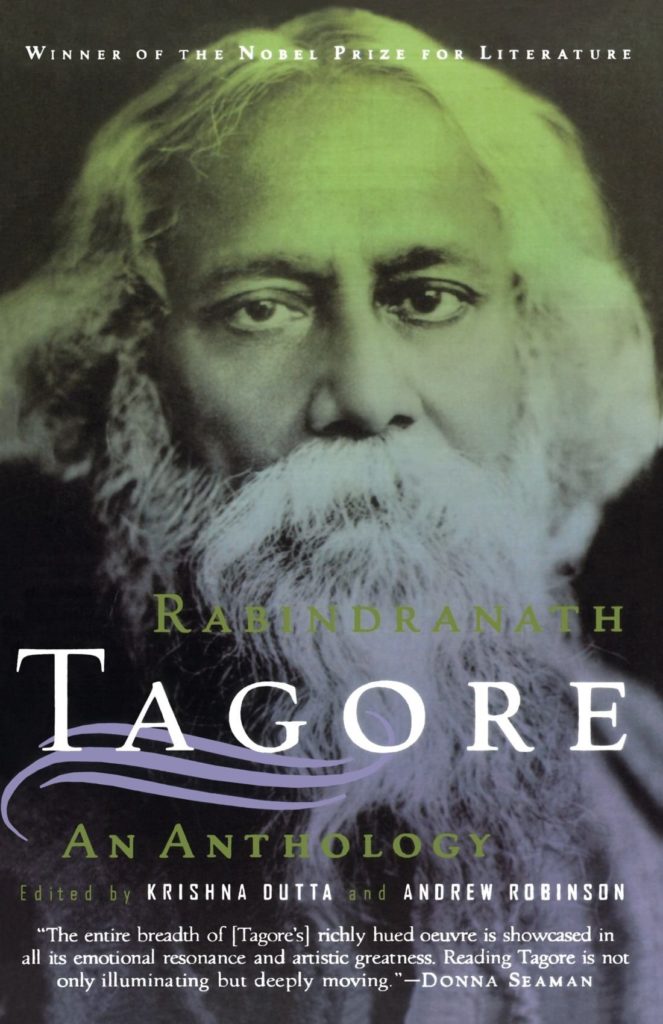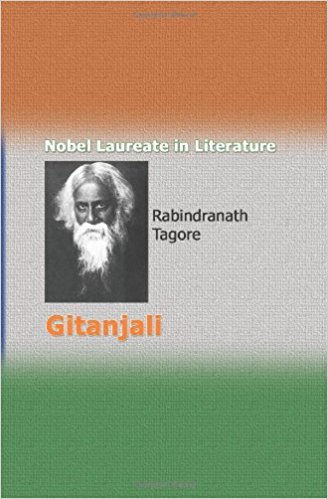Audio
Track:
About
Born on May 6 or 7, 1861 in Calcutta into the Brahmin caste (the family surname, “Tagore,” was an anglicization of the Bengali “Thakur,” which means “Lord”), Rabindranath Tagore came from an affluent, artistic, and well-educated Hindu family who were activists of the Bengali Renaissance. His grandfather Dwarkanath Tagore was one of the first Hindus to visit England; the poet’s father Debendranath Tagore was active in the Brahmo Samaj, a Hindu nationalist movement which stressed the revival of Indian literature and folklore, at the same time that it believed in promoting cross-cultural ties between East and West.
From his boyhood, Tagore wrote verse–some 7,000 lines by the time he was seventeen–inspired by his travels throughout India with his father and influenced by the ancient Bengali Vaishnava poets, as well as by Shakespeare, Shelley, Keats, and the English Romantics. Raised in an atmosphere where the necessity of East and West to each other was a basic tenet, Tagore was sent to England in 1877 to study at University College in London. His year in Britain produced several sentimental dramas, but more importantly it introduced the young poet to his first Western music: the Irish Melodies of Thomas Moore, which he would later incorporate into his play The Genius of Valmiki.
Back home in 1878, Tagore continued to write prolifically, as well as to compose and perform his own Bengali songs. Music figured prominently as a metaphor, a dramatic presence, and prime mover in his verse, and sung melody was often the underlying inspiration for his poetry. Among his early collections are Pictures and Songs and Sharps and Flats, which also contained translations of Moore, Shelley, Browning, and Rossetti. Tagore’s youthful autobiography, My Reminiscences, ends abruptly in his twenty-fifth year with the suicide of his sister-in-law Kamali, with whom he may have been in love.
In the period from 1887 to 1897, Tagore began to experiment with blank verse in his dramas, and to embark on some political writing. He continued to use the song form in poems such as “Manasi,” which recalls Wagner’s “Magic Fire Music,” and Keats’s “Ode to a Nightingale.” The outbreak of the Boer War and the accompanying unrest in the British Empire from 1898 to 1905 increased Tagore’s preoccupation with politics, and strengthened his vision of the poet as a moral presence. Not only did Tagore’s verse become more mystical and religious; he also sought to put into practice his philosophy through the founding of a special school. He called it “Santiniketan” and saw it as a self-governing, idealistic republic in which teacher and pupil enjoyed a close relationship. Staffed by Indian and Western scholars, Tagore’s sacred groves of academe sheltered him and gave him peace through the death of his wife in 1902, of his second daughter in 1904, and of his son in 1907–losses which he commemorated in 27 sonnets to his wife and in The Crescent Moon, a volume of poems that reveal a child’s mind.
From 1905 to 1919 Tagore was active as a speaker, lecturer, organizer, and songwriter for the nationalist Swadeshi Movement, while composing the poems which would bring him international recognition: Gitanjali, Gitimalya, Gitali, and Balaka, all written to be sung, and his play Phalguni. William Butler Yeats, when he first read Gitanjali, exclaimed that the poems were “as much the growth of common soil as the grass and rushes.” After winning the Nobel Prize in 1913, Tagore traveled abroad more extensively–to Europe, North and South America, and Japan–where he met many of the great Western writers and philosophers of the day and lectured on Indian politics and art.
Worried that the British Raj was moving toward ultimate ruin in India, yet convinced that Indian social systems needed to modernize before political freedom would be productive, Tagore avoided the Indian National Congress Movement. He was, however, jolted by Lord Chelmsford’s bloody suppression of the 1919 Punjab riots. Feeling betrayed because he had always believed in the essential fairness of the British character, and torn because he had friends in England, Tagore made a public protest by renouncing the knighthood that had been conferred on him by the British Crown. He suffered from these conflicts, which he struggled to express in his work, though he never abandoned his belief that East and West need each other, and that for India, the Western tradition–from Homer to Christ to modern literature–holds spiritual truths that cannot be ignored.
Though they never met, Tagore has often been compared to Walt Whitman, whose Transcendentalism, Romanticism, and mysticism appealed to the Bengali poet. While most of the uncanny correspondences in their poetry appear to be the result of that curious literary phenomenon of spontaneous simultaneity, Whitman and Tagore share a common theme: that art is a process of self-creation which uses the divine within the individual to grow toward an awareness of the larger purpose of existence.
Tagore died on August 7, 1941. Seven years later, Mahatma Gandhi, who found inspiration in Tagore’s writings, would win independence for India.
–Thomas Hampson and Carla Maria Verdino-Süllwold, PBS I Hear America Singing
Related Information
Songs
Gitanjali: Song Offerings
Song CollectionJohn Alden Carpenter
Rabindranath Tagore
I Am Like a Remnant of a Cloud of Autumn
John Alden Carpenter
Rabindranath Tagore
Song Collection: Gitanjali: Song Offerings
Heaven's River
Song CollectionDavid Leisner
Rabindranath Tagore
Light
David Leisner
Rabindranath Tagore
Song Collection: Heaven's River
Light, My Light
John Alden Carpenter
Rabindranath Tagore
Song Collection: Gitanjali: Song Offerings
On the Day When Death Will Knock
John Alden Carpenter
Rabindranath Tagore
Song Collection: Gitanjali: Song Offerings
On the Seashore of Endless Worlds
John Alden Carpenter
Rabindranath Tagore
Song Collection: Gitanjali: Song Offerings
The Boat
David Leisner
Rabindranath Tagore
Song Collection: Heaven's River
The Day is No More
John Alden Carpenter
Rabindranath Tagore
The first jasmines
Gardner Read
Rabindranath Tagore
Song Collection: Nocturnal visions, op. 145
The First Jasmines
Rabindranath Tagore
Song Collection: Songs to Children, Op. 76
The Sleep That Flits on Baby's Eyes
John Alden Carpenter
Rabindranath Tagore
Song Collection: Gitanjali: Song Offerings
The Time of Parting (op. 84, no. 2)
Henry Hadley
Rabindranath Tagore
To the Stream
David Leisner
Rabindranath Tagore
Song Collection: Heaven's River
When death comes and whispers to me (op. 21, no. 1)
Lowell Liebermann
Rabindranath Tagore
Song Collection: Final Songs, op. 21
When I Bring to You Colour'd Toys
John Alden Carpenter
Rabindranath Tagore
Books
Sheet Music
Gitanjali
Composer(s): John Alden Carpenter
Song(s): 1. When I Bring to You Colour'd Toys
2. On the Day When Death Will Knock
3. The Sleep That Flits on Baby's Eyes
4. I Am Like a Remnant of a Cloud of Autumn
5. On the Seashore of Endless Worlds
6. Light, My Light
Heaven's River
Composer(s): David Leisner
Song(s): 1. The Boat
2. Light
3. To the Stream
"The Time of Parting" (High Voice)
Composer(s): Henry Hadley
Voice Type: High
Buy via Classical Vocal Reprints"The Time of Parting" (Medium Voice)
Composer(s): Henry Hadley
Voice Type: Medium
Buy via Classical Vocal Reprints


